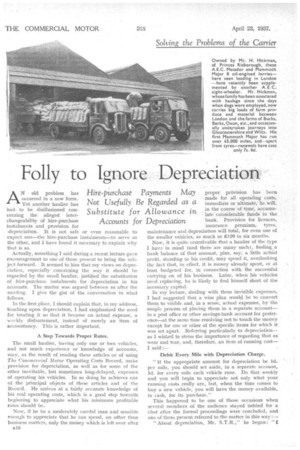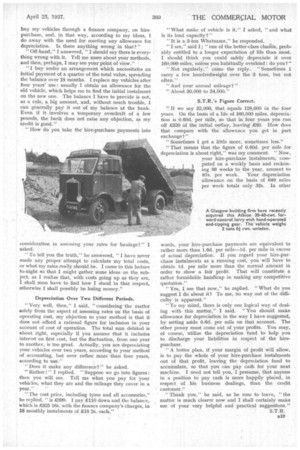Folly to Ignore Depreciation
Page 52

Page 53

If you've noticed an error in this article please click here to report it so we can fix it.
AN old problem has occurred in a new form. Yet another haulier has had to be disillusioned concerning the alleged inter changeability of hire-purchase Accounts for Depreciation
instalments and provision for depreciation. It is not safe or even reasonable to expect one—the hire-purchase instalments—to serve as the other, and I have found it necessary to explain why that is so.
Actually, something I said during a recent lecture gave encouragement to one of those present to bring the subject forward. It seemed to him that my views on depreciation, especially concerning the way it should be regarded by the small haulier, justified the substitution of hire-purchase instalments for depreciation .in his accounts. The matter was argued between us after the meeting. I give the gist of the conversation in what follows.
In thefirst place. I should explain that, in my address, touching upon depreciation, I had emphasized the need for treating it so that it became an actual expense, a weekly disbursement, instead of merely an item of accountancy. This is rather important.
A Step Towards Proper Rates.
The small haulier, having only one or two vehicles, and not much experience or knowledge of accounts, may, as the result of reading these articles or of using The Commercial Motor Operating Costs Record, make provision for depreciation, as well as for some of the other inevitable, but sometimes long-delayed, expenses of operating his vehicles. In so doing he achieves one of the principal objects of these articles and of the Record. He arrives at a fairly accurate knowledge of his real operating costs, which is a good step towards beginning to appreciate what his minimum profitable rates should be.
Now, if he be a moderately careful man and sensible enough to appreciate that he can spend, on other than business matters, only the money which is left over after sla
proper provision has been made for all operating costs, immediate or ultimate, he will, in the course of time, accumulateconsiderable funds in the bank. Provision for licences, insurance premium, tyres, maintenance and depreciation will total, for even one of the smaller vehicles, as much as £120 in six months.
Now, it is quite conceivable that a haulier of the type I have in mind (and there are many such), finding a bank balance of that amount, plus, say, a little actual profit, standing to his credit, may spend it, overlooking the fact that, in effect, it is money already spent, or at least budgeted for, in connection with the successful carrying on of his business. Later, when his vehicles need replacing, he is likely to find himself short of the necessary capital.
In my lecture, dealing with these invisible expenses, I had suggested that a wise plan would be to convert them to visible and, in a sense, actual expenses, by the simple process of placing them in a separate account— in a post office or other savings-bank account for preference—at the same time resolving not to touch the money except for one or other of the specific items for which it was set apart. Referring particularly to depreciation— as I wished to stress the importance of regarding that as wear and tear, and, therefore, an item of running cost— I said : Debit Every Mlle with Depredation Charge.
"If the appropriate amount for depreciation be Id. per mile, you should set aside, in a separate account, id. for every mile each vehicle runs. Do that weekly and you will begin to appreciate not only what your running costs really are, but, when the time comes to buy a new vehicle, you will have the money available, in cash, for its purchase."
This happened to be one of those occasions when several members of the audience stayed behind for a chat after the formal proceedings were concluded, and one of those present referred to the matter in this way:— "About depreciation, Mr. S.T.R.," he began : "I buy my vehicles through a finance company, on hirepurchase, and, in that way, according to my ideas, I do away with the need for meeting any allowance for. depreciation. Is there anything wrong in that?"
Off-hand," I answered, "I should say there is verything wrong with it. Tell me more about your methods, and then, perhaps, I may see your point of view."
"I buy under an arrangement which necessitat s an initial payment of a quarter of the total value, spre ding the balance over 18 months. I replace my vehicles after four years' use : usually I obtain an allowance f r the old vehicle, which helps me to find the initial instalment on the new one. The balance I have to provide 4 not, as a rule, a big amount, and, without much tron le, I can generally pay it out of My balance at the ank. Even if it involves a temporary overdraft of a few pounds, the bank does not raise any objection, my credit is good."
"flow do you take the hire-purchase paymen into consideration in. assessing your rates for haulage?" I asked.
"To tell you the truth," he answered, "I have never made any proper attempt to calculate my total costs, or what my rates really should be. I came to this lecture to-night so that I might gather, some ideas on the subject, as I realize that, with costs going up as they are, I shall soon have to find how I stand in that respect, otherwise I shall possibly be losing money."
Depreciation Over Two Different Periods.
"Very well, then," I said, " considering the matter solely from the aspect of assessing rates on the basis of operating cost, my objection to your method is that it does not afford a rational figure for inclusion in your account of cost of operation. The total sum debitedis about right, especially if you assume that it includes interest on first cost, but the fluctuation, from one year to another, is too great. Actually, you are depreciating your. vehicles over two years, according to your method of accounting, but over rather more than four years, according to use."
"Does it make any difference?" he asked.
"Rather " I replied. "Suppose we go into figures: then you will see. Tell me what you pay for your vehicles, what they are and the mileage they cover in a year."
"The cost price, including tyres and all accessories," he replied, "is £399. I pay 2110 down and the balance, which is £325 16s. with the finance company's charges, in 18 monthly instalments of 218 2s. each." " What make of vehicle is it," I asked, "and what is its load capacity?"
"It is a 3-ton Whatname," he responded.
" I see," said I; "one of the better-class chasks, probably entitled to a longer expectation of life than most. I should think you could safely depreciate it over 160,000 miles, unless you habitually overload : do you?"
"Not regularly," came the reply. "Sometimes .1: carry a few hundredweight over the 3 tons, but not often."
"And your annual mileage?"
",About 30,000 to 34,000."
S.T.R.'s Figure Correct.
" If we say 32,000, that equals 128,000 in the four years. On the basis of a life of 160,000 miles, depreciation is 0.60d. per mile, so that in four years you run off £320 of the initial outlay, leaving £80. How does that compare with the allowance you get in part exchange?"
" Sometimes I get a little more, sometimes less."
" That means that the figure of 0.60d. per mile for depreciation is about right," was my comment. "Now.. your hire-purchase instalments, computed on a weekly basis and reckoning 50 weeks to the year, amount to 87s. per week. Your depreciation allowance on. the basis of 640 miles per week totals only 32s. In other
words, your hire-purchase payments are equivalent to rather more than 1.6d. per mile—ld. per mile in excess of actual depreciation-. H you regard your hire-purchase instalments as .a running cost, you will have to obtain Id. per mile more than the normal amount in order to show a fair profit That will constitute a rather formidable handicap in making any competitive quotation."
" Yes, I see that now," he replied. "What do you suggest I do' about it? To me, no way out of the difficulty is apparent."
'To my mind, there is only one logical way of dealing with this matter," I said. "You should make allowance for depreciation in the way I have suggested, by setting aside 0.6d. per mile on that account. The Other penny must come out of your profits. You may, of course, utilize the depreciation fund to help you to discharge your liabilities in respect of the hirepurchase.
"A better plan, if your reArgin of profit will allow, is to pay the whole of. your hire-purchase instalments out of that profit, leaving the depreciation fund to accumulate, so that you can pay cash for your next machine. I need not tell you, I presume, that anyone in a position to pay cash is more happily placed, in respect of his business dealings, than the credit customer." • "Thank you," he said, as he rose to leave, "the matter is much clearer now and I shall certainly make use of your very helpful and practical suggestions." S.T.R. B19




























































































